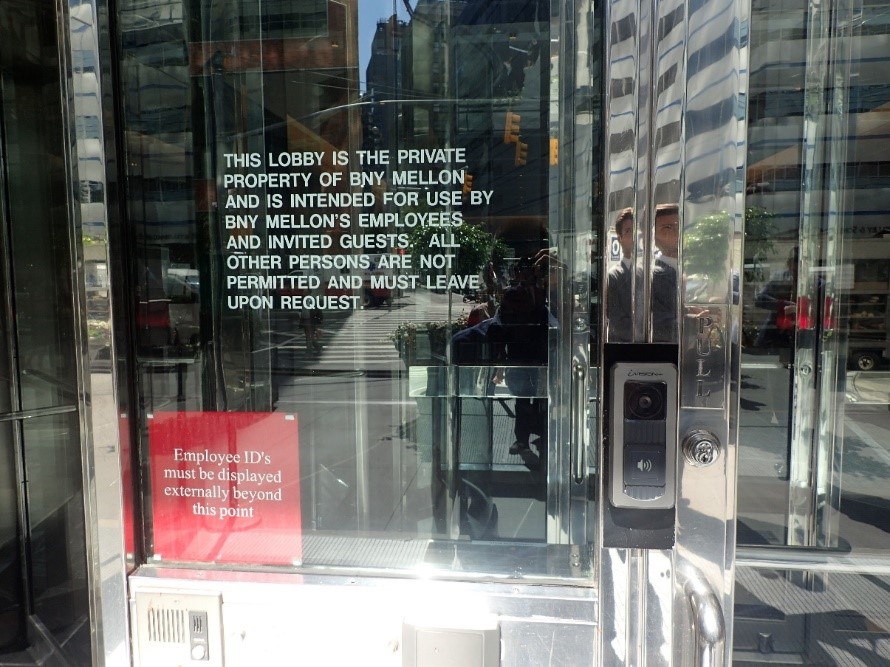With City Enforcement Lagging, Public Continues to be Denied Amenities at Privately-Owned Public Spaces
After Comptroller documents 182 cases of building owners denying required public amenities, Department of Buildings still refuses to conduct pro-active inspections
More than 94 percent of privately owned public spaces sampled in a follow-up review continue to violate agreements, and fail to provide the required public amenities
Comptroller Stringer renews call for an immediate top-to-bottom review of all POPS sites by the City
(New York, NY) – New York City Comptroller Scott M. Stringer today released a follow-up review about the lack of enforcement at the Department of Buildings (DOB) regarding privately-owned public spaces – known as POPS.
Privately-owned public spaces are outdoor or indoor spaces that are built for public use, for taxpayers’ benefit, by the developers of private buildings. In exchange for creating that public space, those developers are allowed to construct buildings higher and denser than would otherwise be allowed by applicable zoning regulations. The Zoning Resolution of the City of New York in effect when each of the City’s POPS was created sets the standards that govern the amenities provided by each POPS, and DOB is responsible for enforcing the Zoning Resolution to make sure the public gets those amenities. An initial audit issued in April 2017 by Comptroller Stringer found extraordinary lapses in City enforcement, with the public denied access either to the sites or to the amenities that should be there, such as seating, drinking fountains, and bike racks, as specifically mandated by the applicable POPS agreements. That audit found that most POPS locations hadn’t been inspected in years by the City.
Today’s follow-up review found that the Department of Buildings continues not to inspect these sites, knowingly allowing violations to continue. Currently, New York City property owners benefit from approximately 23 million square feet of additional zoning floor area in their buildings, in exchange for providing public space at 333 locations. Yet, the property owners have enjoyed the financial benefits without fully meeting the obligations of their zoning agreements.
In the Comptroller’s follow-up review, auditors inspected a sample of 34 of the 182 POPS locations that were found to be non-compliant in the initial April 2017 audit, and determined that 32 of them – more than 94 percent of the sample – still violated their agreements, even though DOB had been informed of the violations.
Violations include:
- Public access restricted by some type of fence, barricade or chain;
- Signs stating “For Private Use Only” despite locations’ being public space;
- A lack of required amenities (e.g., artwork, bicycle parking, drinking fountain, elevator, lighting, litter receptacles, planting, plaque/sign, seating, tables, trees, and a sufficient number of chairs); and
- Restaurants that were occupying portions of public space by placing tables and chairs for their private patrons to the exclusion of the public.
“New Yorkers are getting cheated out of public resources – and the developers are getting benefits and giving back nothing in return. The City is letting it happen. By not proactively enforcing the agreements, it’s leaving money on the table and failing to protect the public’s interest. All of it defies common-sense. This is willful neglect by our own government,” said Comptroller Scott M. Stringer. “DOB’s disregard of the facts, its denial of documented evidence, and its ineffective monitoring procedures enable building owners to break their agreements. This is utterly preventable. That’s why I’m renewing my call for the City to step up, protect taxpayers, and vigorously enforce the law.”
Even though the Department of Buildings is primarily responsible for ensuring compliance and issuing violations, the City has refused to proactively inspect POPS locations, opting for performing inspections only when individual complaints are received. However, even after receiving the initial audit and learning that 182 sites were non-compliant with their POPS agreements, DOB refused to act, choosing instead to ignore the extensively documented violations found in the Comptroller’s initial audit. As a result, building owners are being allowed to deny required amenities to residents and taxpayers.
One example includes the follow-up inspection of the POPS location at 101 Barclay Street, Manhattan. At this site, the Comptroller’s Office found that the indoor space that should have been open to the public was entirely closed off. During the initial audit building security informed auditors that this lobby had been closed to the public for at least 15 years – and auditors who tried to enter during the follow-up review were once again denied access to the lobby.
101 Barclay Street, Manhattan

July 20, 2016

August 14, 2017
DOB actually rejected the original audit’s recommendation that it proactively inspect all 333 POPS locations for compliance on a periodic basis. Instead, DOB officials stated that the agency would continue to conduct inspections only in response to complaints.
Based on the findings of this follow-up review Comptroller Stringer is reissuing three recommendations, including:
- DOB should inspect all 333 POPS locations to ensure that they are in compliance with their agreements to ensure that they are still in existence, provide the required amenities, and offer public access as required, and DOB should prioritize inspections of the 182 noncompliant POPS locations identified in the original audit;
- DOB should develop a monitoring policy that requires all POPS to be inspected by DOB at sufficiently frequent intervals to ensure effective enforcement of the Zoning Resolution; and
- DOB should schedule inspections of the outdoor POPS locations during warmer months when certain types of non-compliance would more likely to be observed, such as use of a POPS by a restaurant for outdoor seating.
To read the full follow-up review, click here.
To read the initial audit, click here.
###